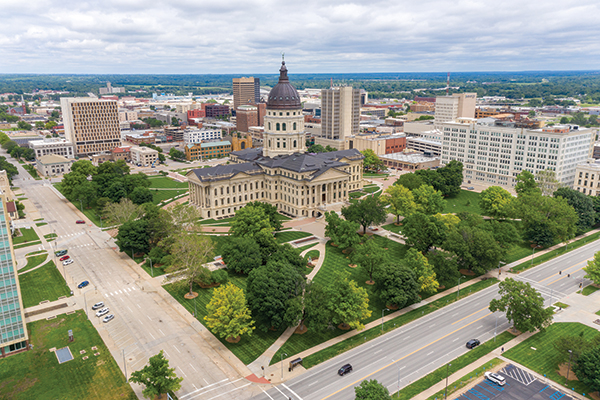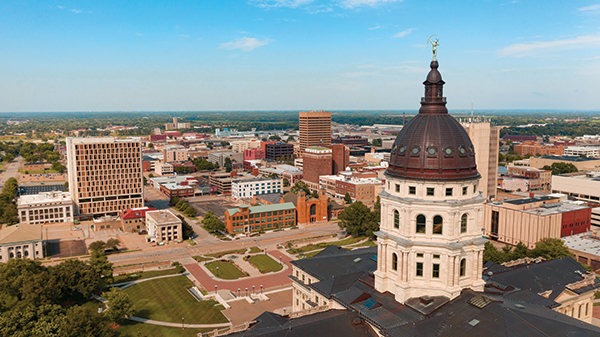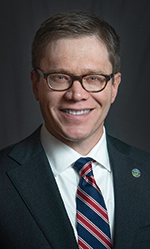Coming off a record year for economic development despite dealing with a global pandemic and nationwide recession, Kansas Lieutenant Governor and Commerce Secretary David Toland says this is no time to become complacent.
Stacked with a prospect pipeline that is as jam-packed as any the state has ever seen, Toland says that Kansas’ winning streak will continue in 2022. For more perspective on this, we interviewed Toland.
What were your three biggest project wins of the year?
David Toland: Kansas has landed some huge investments since the start of 2020, with successful expansions from both domestic and international firms. Our project pipeline is overflowing with a huge number of prospects.
This dramatic push forward drove a record-setting year for capital investment in 2021: more than $3.7 billion was invested by businesses — the highest amount in our state’s history — with nearly 14,000 jobs created or retained.
What are your top priorities for 2022?
Toland: We are on a record-breaking pace for economic development since Governor Kelly took office, and remain focused on seizing still more new opportunities for rapid growth.
The Kansas Framework for Growth, the Kelly administration’s strategic plan to grow Kansas now and in the future, is guiding us toward more economic development successes across all sectors. We have sound strategies in place to continue supporting the Kansas workforce and aligning talent with industry demand to get more people back to work in good-paying jobs.
And we’re working every day to achieve gains in affordable housing; accessible childcare; improved broadband connectivity; and other ways to ensure the outstanding quality of life we need to keep Kansans here, and lure those who left back to our great state.
What role does quality of life play in economic development across Kansas?
Toland: Quality of life is an essential component to economic development. Companies and people locate in strong communities where folks want to live. For this reason, quality of life is central to the Kelly Administration’s overall economic development efforts. As a state, Kansas is all in when it comes to improving communities and maximizing economic opportunities.
Every new resident to Kansas starts first as a visitor, and the Kansas Tourism division works make our state a premier place to live and play. Governor Kelly has placed a high priority on elevating Tourism and aligning it with our overall economic development goals. With the Tourism division now located in the Department of Commerce, Kansas is focused on bringing new residents and new dollars to communities all across the state.
In addition to Tourism, our Community Development Division and Office of Rural Prosperity at the Department of Commerce are doing extraordinary work in efforts to provide the tools and skills needed to create thriving, resilient communities. Governor Kelly has made a high priority of investments in infrastructure, the arts, downtown development and other areas good for rural communities, entrepreneurs and small businesses across our state. Every investment in critical infrastructure, for example, also helps communities compete when it comes to retaining and recruiting residents and businesses.
We are on a record-breaking pace for economic development since Governor Kelly took office, and we remain focused on seizing still more new opportunities for rapid growth.
— Lt. Gov. David Toland
This past year, we supercharged our efforts to empower Kansas communities through programs, partnerships and support. Among the gains achieved due to numerous initiatives in Kansas:
- More communities now are participating in Kansas Main Street, a proven economic development program Governor Kelly resurrected after taking office. We know vibrant downtowns are a key indicator of a community’s overall health. Plus, they significantly impact the quality of life we need to retain and attract residents.
- The Community Development Division and the Office of Rural Prosperity continue to develop strategies to address critical housing gaps, such as repurposing upper stories in downtown districts. In addition, a long-overdue housing needs study completed in 2021 will continue to provide critical data for future state and local housing development efforts.
- Historic Economic Asset Lifeline (HEAL) grants were created by the Department of Commerce to offer matching grants for the revitalization of underutilized, vacant or dilapidated downtown buildings. The grants are intended to bring buildings back into productive use as spaces for new or expanding businesses, childcare, housing, arts and culture, civic engagement or entrepreneurship.
- A special round of CDBG grants — totaling nearly $2.8 million — were awarded in 2021 to provide relief for communities as they work to recover from the COVID-19 pandemic. This funding helped support more than 1,300 small businesses across the state, while retaining more than 5,300 jobs.
What is your state’s best-kept secret?
Toland: We’re offering the best place in the nation to do business and the best place to live and raise a family.
We want folks who grow up in Kansas and those from beyond our borders to embrace our state’s appeal. Now more than ever before, Kansas is focused on attracting new residents and keeping talented graduates in our state. To ensure that they all have good places to call home, we’ve placed renewed emphasis on developing livable and workable communities in Kansas.
These efforts range from impressive new plans for broadband expansion to the proliferation of Main Street programs, and beyond. Quality of life for all our workers — indeed, all our residents — is paramount.
As global supply chain disruptions have hit virtually every industry on the planet, how does Kansas’ central U.S. location help businesses compete?
Toland: Companies large and small are in the midst of rethinking their current supply chains. This represents a huge opportunity for Kansas. When it comes to reaching the entire U.S. market quickly and efficiently, there is no better place to locate than our state.
With ready infrastructure and an outstanding workforce, Kansas can provide certainty and stability in company supply chains—making it the ideal place to invest and build more profitable sourcing and siting strategies.
To support Kansas manufacturers, Governor Kelly recently announced the official launch of CONNEX™ Kansas, a new program from Kansas Manufacturing Solutions (KMS) and the Kansas Department of Commerce designed to strengthen the Kansas manufacturing supply chain.
CONNEX™ Kansas is an online manufacturer database and connectivity platform provided as a free resource for Kansas manufacturers. The platform is designed to allow manufacturers in Kansas to connect with each other, find local and domestic suppliers, explore production capabilities and manage their supply chain.
What is Kansas doing to promote innovation and entrepreneurship?
Toland: In June we launched the Office of Innovation and named Trent Armbrust our new Chief Strategy Officer to lead that office and the implementation of our Framework for Growth. The Framework — Kansas’ first economic development plan in more than 30 years — features four pillars, and one is innovation. Driving innovation into our economy is important in attracting business and people to Kansas.
We also launched The Kansas Innovation and Technology Enterprise (KITE) to cultivate and support innovation in Kansas. Through KITE, companies with advanced, innovative technology can find resources to help them expand, creating additional revenue and new jobs in Kansas. KITE programs are designed to further research, spur commercialization and assist entrepreneurs in raising funds to expand their businesses.
The KITE Proof of Concept (POC) was also launched and is designed to fill a need for support where typical funding mechanisms are not available, acting as a bridge between federal funding for basic research and commercial seed funding by Angel or venture investors.
We’re offering the best place in the nation to do business and the best place to live and raise a family.
— Lt. Gov. David Toland
The POC program is designed to assist in the establishment of promising new technology-based entrepreneurial ventures within the state, and the commercialization of inventions resulting from research conducted at Kansas public universities.
The Kansas Angel Investor Tax Credit Program is administered by the Kansas Department of Commerce and is designed to bring together accredited angel investors with qualified Kansas companies seeking early-stage investment. The “Kansas angels” program helps provide access to capital for Kansas start-ups.



